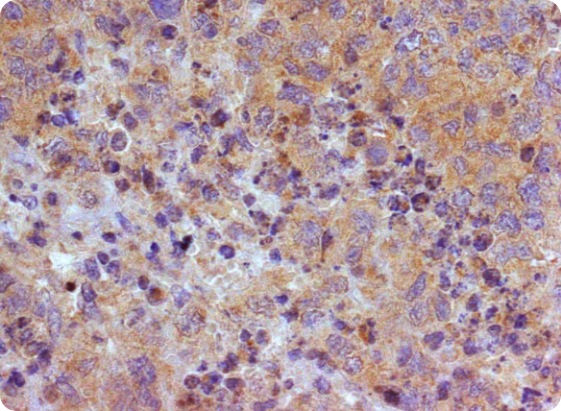Apr 12 2010
Research on the development of a new therapeutic agent for the treatment of particularly aggressive ovarian cancer has produced some very promising initial findings. In laboratory tests, scientists have succeeded in reducing the resistance of the tumour cells to a natural resistance mechanism with the help of a monoclonal antibody. The results of this project, which was funded by the Austrian Science Fund FWF, have just been published. The project also succeeded in establishing a hitherto unknown connection between so-called "natural killer cells" and the regulated death of cancer cells. 
When it comes to cancer cells, suicide has its positive side - at least from the perspective of the human body. A mechanism found in the bodies of higher organisms, known as "regulated cell death" or apoptosis, actually eliminates potentially harmful cells. The human body also has a protective mechanism of this kind that acts against ovarian cancer cells. The mechanism is initiated by the messenger substance TRAIL (Tumour Necrosis Factor Related Apoptosis Inducing Ligand) which binds to receptors on tumour cells and triggers a suicide program. The fact that ovarian tumours emerge despite this - making ovarian cancer the most fatal form of the diseases affecting the female sexual and reproductive organs - is due to resistance to TRAIL: some tumour cells simply fail to react to the suicide signal. A group of scientists working with Prof. Michael Krainer, Director of the Molecular Genetics Working Group, Department of Oncology, University Clinic for Internal Medicine I, Vienna General Hospital, has been researching ways of overcoming this resistance.
Invaluable assistance in this task was provided by a monoclonal antibody, a special protein that identifies cell structures with a high degree of specificity. The antibody in question, which is known as AD5-10, binds specifically to the receptors that usually receive and transmit the TRAIL signal. "In addition to studies, in which TRAIL itself is used as a therapeutic agent, so-called monoclonal antibodies are also being researched which, like AD5-10, bind to the TRAIL receptor. Yet they can only trigger a suicide signal if there is no resistance to TRAIL. AD5-10 is special, however, because, although it binds to the TRAIL receptor like the other monoclonal antibodies, it does not bind at the precise location where the TRAIL itself docks. Therefore, AD5-10 can arise bound to the receptor along with TRAIL", reports Prof. Krainer.
Prof. Krainer's team has proposed an interesting hypothesis that takes into account the unique binding site of AD5-10 to the receptor. It is possible that, due its special point of action, AD5-10 can influence the effect of TRAIL and perhaps also counteract resistance. Prof. Krainer had the following to say about the results obtained by his group: "It actually works! We were able to show in both cell cultures and animal models that TRAIL-resistant ovarian cancer tumour cells become sensitive to TRAIL again if TRAIL and AD5-10 are both present at the same time."
Prof. Krainer suspected, furthermore, that AD5-10 could reinforce the effect of drugs frequently used in chemotherapy. Therefore, he examined the interaction between AD5-10 and numerous drugs used in the treatment of ovarian cancer. These tests were also successful: "We were able to show in cell cultures that the combined effect of AD5-10 and carboplatin - a common chemotherapeutic agent - was greater than the sum of their effects when administered individually. Moreover, tests on animal models showed that AD5-10 can eliminate resistance to carboplatin."
Prof. Krainer's team also observed that the anti-tumour effect of AD5-10 only arises when so-called natural killer cells (NK Cells) are found in the tumour microenvironment. For Prof. Krainer this is a promising indication of the fact that these cells play an important role in apoptosis, as initiated by AD5-10. This may well provide the starting point for a follow-up research project.
Original publication: Natural immunity enhances the activity of a DR5 agonistic antibody and carboplatin in the treatment of ovarian cancer. A. El-Gazzar, P. Perco, E. Eckelhart, M. Anees, V. Sexl, B. Mayer, Y. Liu, W. Mikulits, R. Horvat, T. Pangerl, D. Zheng, M. Krainer, Mol Cancer Ther, 1535 - 7163.MCT-09-0933; Published OnlineFirst April 6, 2010; doi:10.1158/1535-7163.MCT-09-0933